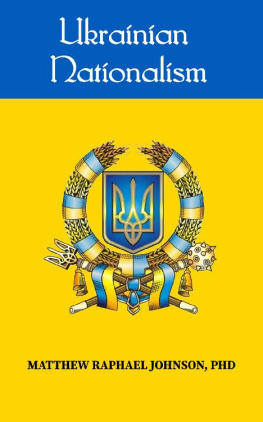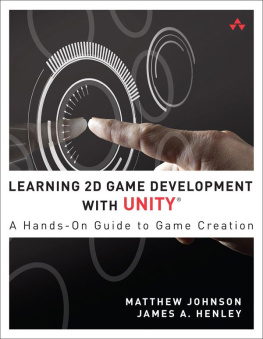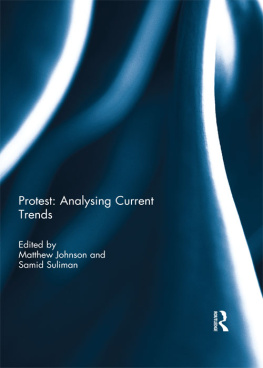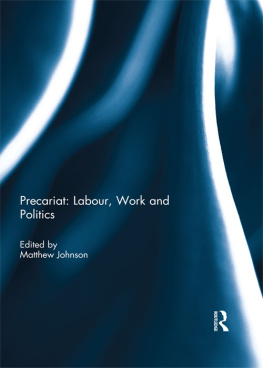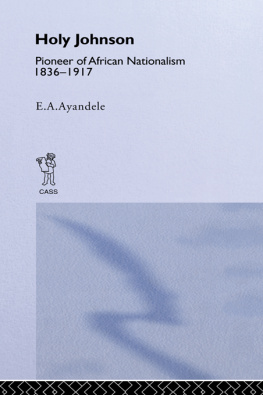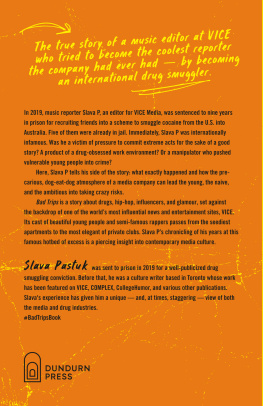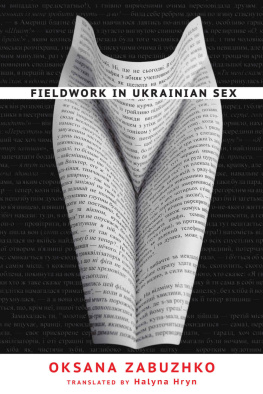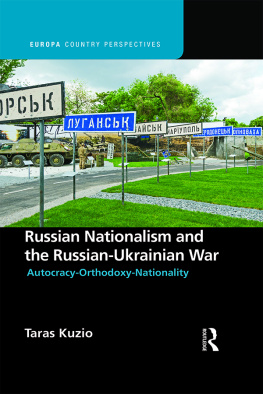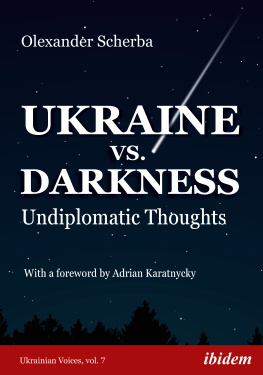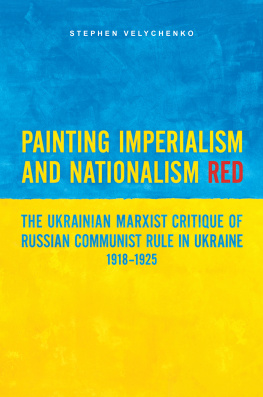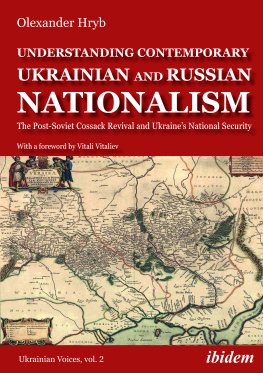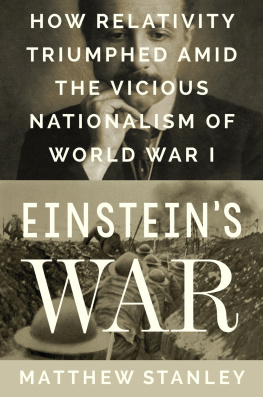Matthew Johnson - Ukrainian Nationalism
Here you can read online Matthew Johnson - Ukrainian Nationalism full text of the book (entire story) in english for free. Download pdf and epub, get meaning, cover and reviews about this ebook. year: 2019, genre: Religion. Description of the work, (preface) as well as reviews are available. Best literature library LitArk.com created for fans of good reading and offers a wide selection of genres:
Romance novel
Science fiction
Adventure
Detective
Science
History
Home and family
Prose
Art
Politics
Computer
Non-fiction
Religion
Business
Children
Humor
Choose a favorite category and find really read worthwhile books. Enjoy immersion in the world of imagination, feel the emotions of the characters or learn something new for yourself, make an fascinating discovery.
- Book:Ukrainian Nationalism
- Author:
- Genre:
- Year:2019
- Rating:5 / 5
- Favourites:Add to favourites
- Your mark:
- 100
- 1
- 2
- 3
- 4
- 5
Ukrainian Nationalism: summary, description and annotation
We offer to read an annotation, description, summary or preface (depends on what the author of the book "Ukrainian Nationalism" wrote himself). If you haven't found the necessary information about the book — write in the comments, we will try to find it.
Ukrainian Nationalism — read online for free the complete book (whole text) full work
Below is the text of the book, divided by pages. System saving the place of the last page read, allows you to conveniently read the book "Ukrainian Nationalism" online for free, without having to search again every time where you left off. Put a bookmark, and you can go to the page where you finished reading at any time.
Font size:
Interval:
Bookmark:
Ukrainian Nationalism
Matthew Raphael Johnson
Chapters and Titles
Chapters and Titles
Contents
Back Cover
Acknowledgements
Preface
Chapter 1- Introduction: Ukraine and the Nation
Chapter 2- The Hetmanate as the Central Element
in Ukrainian Political Ideas: The Background to Ukrainian Social Thought
Chapter 3- From Pereslav to Andrusovo: The Horror of the 17th Century
Chapter 4- Ivan Vyshenskii, Hyhorii Skovoroda
and the Philosophy of the Ukrainian Baroque
Chapter 5- Taras Shevchenko: The Prophet of Ukrainian Nationalism
Chapter 6- Shevchenko's Pupils: National-Anarchism in the Social Theories of
Mykailo Kostamarov, Mikhail Drahomanov and Ukrainian National Idea
Chapter 7- The Synthesis of Drahomanov, Shevchenko and Suffering Ukraine:
The Political Philosophy of Ivan Franko
Chapter 8- Two Autocephalous Orthodox Churches in the 20th Century:
Vasyl Lypkivsky and the Kharkiv and Poltava Movement
Chapter 9- The Ukrainian Autocephalous Orthodox Church under
Patriarchs Volodymyr (Romanyuk) and Dmitri (Jarema)
Chapter 10- What Hrushevsky Wrought: An Overview of Ukrainian Nationalism
in Second Half of the 20th Century
Chapter 11- The Failure of Independence:
From the Second World to the Void, 1990 to 2015
Conclusion
Bibliography
Footnotes
Contents
Back Cover
Ukraine, from a Russian Orthodox nationalist like myself, has been hijacked by westerners and Uniats who loathe all forms of national assertiveness. Faux-nationalist groups were used in the violent coup of 2014 and then cast aside as embarrassments later. The fact is that the Ukrainian pantheon of nationalist writers, including Bandera himself, were philosophically no different than nationalists anywhere else, seeking to protect a national tradition from imperial states that sought to destroy and exploit it. Unfortunately, they had a good case both under the Petrine state and the USSR.
Like Belarus, Ukraine should have a strong alliance with Russia. Her goods are wanted there, but the west can barely buy up its own goods, let alone more from Ukraine. What can Ukraine offer the west that its own capitalist's don't already provide? Had Kiev signed the Union Treaty in 2003, she would be far more prosperous than she is now. Ukrainian nationalism, like Georgian or Lithuanian, isn't inherently anti-Russian. However, the rhetoric from the American-financed coup seemed to suggest otherwise. My book lays out, in detail, the historical justification for that view.
Acknowledgments
The typical book on Ukrainian history is written in well funded universities by alienated, urban and cultureless professors. These privileged dons have an army of research assistants (sometimes called students) whose uncopyrighted research is no doubt valuable as raw material. High salaries, total job security, secretaries, graduate assistants, grant money and a host of other privileges make their job much easier. How much of their books is really their work is something that is not likely to be solved. Given that so much of this is written by others, with the assistance of so many others, and on university time generously funded by taxpayers (among other people), the claim to copyright is a sick joke. While their privileges are many, it does come at a price: their total lack of freedom.
This book was written without any of that. All the work, research, translations, copyreading and proofreading is for better or worse the responsibility of the author. If the reader finds a typo or an inadvertent mistake, let it slide give me a break. Had I the resources of the typical author in this field, it would be less excusable.
In the process of writing this book my life has changed so radically I seem to be in some surrealist dream-state. So much of the work that went into this large tome was, to some extent, a means of distracting myself from it all. I guess this is a healthy approach.
My son Michael deserve mention as my one true, real victory. They are assets to humanity.
My students, especially from my time as a professor at Mount St. Mary's University (2005-2008), a time cut short due to mismanagement and corruption, deserve a special thanks.
This book is dedicated to the memory of the late Hieroschemamonk Brendan (Williams), who died in May of 2015 after 40 years of intense suffering from fibromyalgia, lupus and a host of other diseases I would not wish on anyone. Once he built up a tolerance to all pain medication, he felt the raw, grinding and acidic pain of his diseases. Fr. Brendan was my spiritual brother for many years and his death, at least to him, was a welcome relief. Though it all, he retained his sense of balance, his mood and occasionally, his sense of humor. He will be sorely missed.
MRJ
Johnstown, PA
June 2018
Preface
The Ukrainian Debacle
This work was written at a time when Ukraine and Ukrainian history was front page news. Throughout 2014 and 2015, the west was treated to Ukrainian identity, albeit mangled and misrepresented, that heretofore could not have been more foreign. Nothing has changed. The misinformation has made the educated public far less able to understand the situation than ever before. Ukraine at the end of 2015 is a tragic, pathetic farce. Her present misery is proof of the evil presently ruling our world.
Ukraine, from a Russian Orthodox nationalist like myself, has been hijacked by westerners who loathe all forms of national assertiveness. Faux-nationalist groups were used in the violent coup of 2014 and then cast aside as embarrassments later on. The fact is that the Ukrainian pantheon of nationalist writers, including Bandera himself, were philosophically no different than nationalists the world over. Bandera was many things, a Nazi was not one. I've sympathized with the plight of Novorossiya from day one, but their condemnations of the Kiev government as Nazi are laughable. Bandera would have condemned each and every aspect of that coup. He loathed and distrusted the west, capitalism and usury, precisely the forces that took over the country.
Since independence, the industry of Ukraine has been hollowed out and today, no longer exists. What little remains in Ukrainian hands is poorly maintained and produced extremely poor goods. All profitable industry has been liquidated and sold off to pay debts. Vladimir Dubrowski of The Ukrainian Center for Socioeconomic Research (CASE ), however, states the following:
The de-industrialization of Ukraine is favorable. In the long run, the capital and labor of industry in Ukraine is unlikely to be competitive... In tropical and subtropical countries, there is no need to spend money on heating and warm clothes. Therefore, they can provide labor-intensive production of cheap labor and will have a greater competitive advantage. Thus, in Ukraine there is no cheap labor, nor a favorable economic climate. Its rapprochement with Europe will fix this problem, but it would not be under the countries of the EEA or the Customs Union.
One thing that cannot be denied is that Ukrainian independence has been a miserable failure. Yet within this failure, western banks continue to lend and prop up the Washington-backed Poroshenko state. There is no chance of even a partial repayment. Franklin-Templeton Funds has been one of the main underwriters of this failure. Between 2013-2014, this fund lent the Ukrainian state $9 billion and charged a moderate risk 7.2% annual rate. It is fairly clear that markets have no role here, and politics has center stage. Further, they have agreed to write off 20% of Ukraine's previous debt only to justify lending them more money. There is no reason to believe that any accurate accounting of this money will ever be made, as is in the case of the $1 billion loan to Moldova. At the moment, Ukraine remains generally useful to the west, though this usefulness is now running out of gas, so to speak.
Next pageFont size:
Interval:
Bookmark:
Similar books «Ukrainian Nationalism»
Look at similar books to Ukrainian Nationalism. We have selected literature similar in name and meaning in the hope of providing readers with more options to find new, interesting, not yet read works.
Discussion, reviews of the book Ukrainian Nationalism and just readers' own opinions. Leave your comments, write what you think about the work, its meaning or the main characters. Specify what exactly you liked and what you didn't like, and why you think so.

